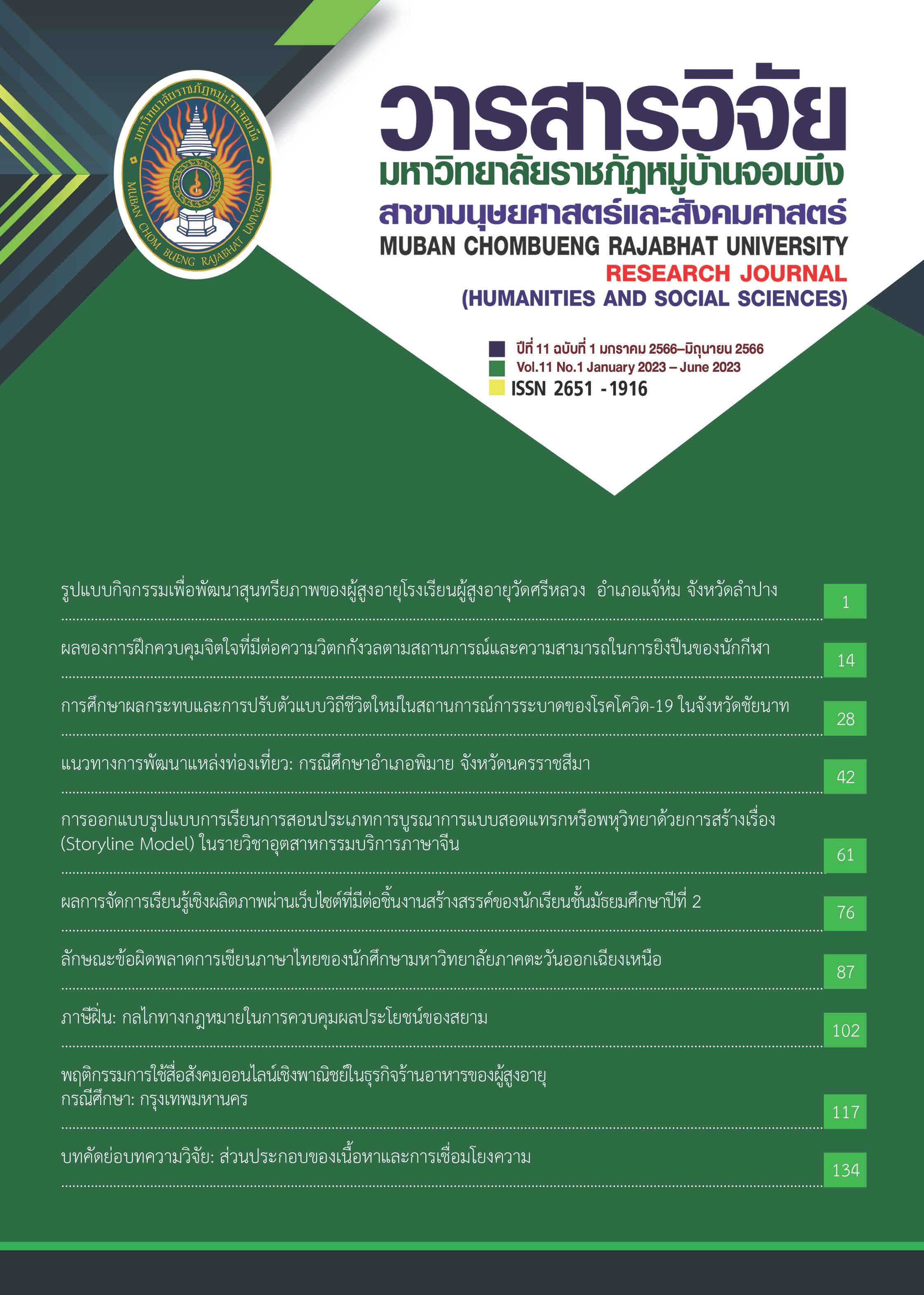The Elderly’s Behavior using Social Commerce in the Restaurant Business Case Study: Bangkok Province
Keywords:
Behavior of Commercial Social Media, Restaurant Business , The ElderlyAbstract
The purposes of this research were to 1. investigate the elderly’s behavior in commercial use of social media in the restaurant business in a case study of Bangkok province, and 2. provide a guideline for appropriately developing and adjusting online marketing models and strategies for commercial use of social media in restaurant business. A closed-ended and open-ended questionnaire was used to collect the data from 400 samples of the elderly using a sampling method for uncertain populations. Statistics used in the study were percentage, mean, standard deviation for each item, and hypothesis testing, t-test and F-test.
Th research results were presented and statistical analysis was revealed that, 1) regarding personal factors, the majority of the elderly respondents were female ( =51.7), aged between 60 and 69 (
=55.8), received a bachelor’s degree (
=53.3), were married (
=79.0), earned between 10,001-20,000 baht, and lived in Bangkok; 2) In term of experience, the most frequent use of social media in restaurant business for ordering food and beverage was 1-3 days per time (
=86.5), on Sunday (
=58.5), between 12:00 and 15:00 (
=43.5), and via Grab Food (
=79.3) and Line (
=70.0); 3) as for the elderly’s behavior in the commercial use of social media in the restaurant business, nine aspects of the behavior were at a very high level (
= 3.59), six were at a high level, and three were at a moderate level;
References
กันตพล บันทัดทอง. (2558). พฤติกรรมการใช้เครือข่ายสังคมออนไลน์ และความพึงพอใจของกลุ่มคนผู้สูงอายุ ในเขตกรุงเทพมหานคร. กรุงเทพฯ: มหาวิทยาลัยกรุงเทพ.
ธานินทร์ ศิลป์จารุ. (2563). การวิจัยและวิเคราะห์ข้อมูลทางสถิติด้วย SPSS และ AMOS. (พิมพ์ครั้งที่ 18). นนทบุรี: เอส. อาร์. พริ้นติ้ง แมสโปรดักส์.
สำนักงานคณะกรรมการข้าราชการพลเรือน. (2556). เลขาธิการ ก.พ. เผยเตรียมปรับอายุเกษียณ. สืบค้นเมื่อ 21 ตุลาคม 2563, จาก http://www.ocsc.go.th/ocsc/th/index.php
สุภาวดี ปิ่นเจริญ. (2558). การตลาดผ่านสื่อสังคมออนไลน์และการยอมรับเทคโนโลยีที่มีผลต่อการตัดสินใจใช้บริการจองร้านอาหารผ่านโมไบล์แอปพลิเคชันของผู้บริโภคในกรุงเทพมหานคร. การค้นคว้าอิสระ, มหาวิทยาลัยกรุงเทพ, กรุงเทพฯ.
Basu, S. (2018). Information search in the internet markets: Experience versus search goods. Electronic Commerce Research and Applications, 30, 25-37.
Cui, Y., Mou, J., & Liu, Y. (2018). Knowledge mapping of social commerce research: a visual analysis using CiteSpace. Springer Science+Business Media.
Doha, A., Elnahla, N., & McShane, L. (2019). Social commerce as social networking. Journal of Retailing and Consumer Services, 47, 307–321.
Han, H., Xu, H. & Chen, H. (2018). Social commerce: A systematic review and data synthesis. Electronic Commerce Research and Applications, 30, 38-50.
Huang, Z., & Benyoucef, M. (2017). The effects of social commerce design on consumer purchase decision-making: An empirical study. Electronic Commerce Research and Applications, 25, 40–58.
Paitoon, P. (2018). Factors Influencing a Thai Individual’s Trust and Distrust in Social Commerce. Humanities, Arts and Social Sciences Studies, 18(3), 757-808.
Tang, J., & Zhang, P. (2018). The impact of atmospheric cues on consumers’ approach and avoidance behavioral intentions in social commerce websites. Computers in Human Behavior, 10(1016), 38–48.
Tapscott, D. (2015). The digital economy. ANNIVERSARY EDITION: rethinking promise and peril in age of networked intelligence. (2nd ed.). New York: Mc Graw-Hill.
Downloads
Published
How to Cite
Issue
Section
License
Copyright (c) 2023 Muban Chombueng Rajabhat University Research Journal (Humanities and Social Science)

This work is licensed under a Creative Commons Attribution-NonCommercial-NoDerivatives 4.0 International License.
Journal of TCI is Licensed under a Creative Commons Attribution-NonCommercial-NoDerivatives 4.0 International (CC BY-NC-ND 4.0) licence, unless otherwise stated, Please read our Policies page for more information on Open Access, copyright and permissions.



